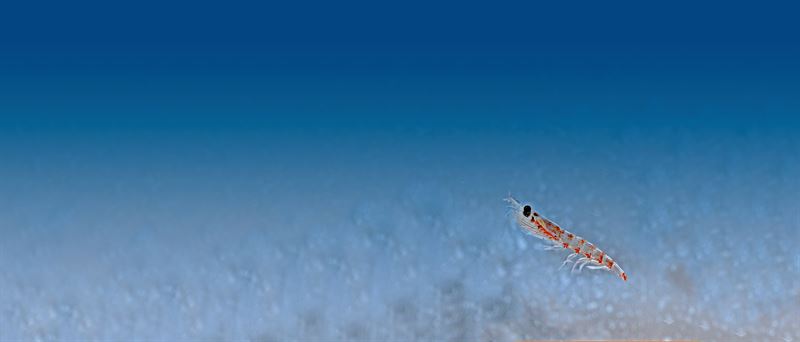New study confirms growth effect of astaxanthin krill oil on Pacific white shrimp

Shrimp farmers seek growth and feed efficiency for their crops, but this can be challenging when water salinity concentration in commercial pondsis high. In a new study, now published in the Journal of Applied Aquaculture, scientists from Instituto de Ciências do Mar (Labomar), Brazil and Aker BioMarine evaluate whether high salinity conditions can be offset with the dietary supplementation of astaxanthin krill oil and soybean oil.
“Hypersalinity is known to suppress growth and reduce feed efficiency in juvenile Pacific white shrimp, and according to previous scientific research, astaxanthin in krill is an effective supplement to compensate for high salinity. We wanted to go one step further, to measure whether the positive effects of the astaxanthin krill oil on shrimp growth differ, with or without the addition of soybean oil,” says Dr. Alberto J.P. Nunes, Professor from Labomar, and one of the authors of this study.
The experiment tested combinations of astaxanthin krill oil and soybean oil on juvenile shrimp
For the 74-day experiment, the juvenile Pacific white shrimp were divided between 50 exposed and enclosed tanks of 1-m3 each with varying levels of salinity; though only the enclosed tanks continuously maintained hypersaline conditions. The two sources of oil, soybean and astaxanthin krill, were applied as top-coat to a commercial grower shrimp feed. The oils were either used in combination or alone for the various feeds in the experiment, while the control diet was simply the commercial feed without oil.
Key findings
- This study confirms previous findings that hypersalinity adversely affects growth and feed efficiency of juvenile Pacific white shrimp.
- In the exposed tanks, where the salinity levels were lower, the shrimp receiving a diet supplemented with one percent krill oil and two percent soybean oil achieved a significantly higher body weight compared to the control group and the soybean oil-only group.
- In the enclosed tanks, where the salinity levels were consistently high, the shrimp required a two percent krill oil and one percent soybean oil supplement to maximize final body weight.
- Overall, the shrimp yield was significantly influenced by the oil-enhanced diets in both types of tanks.
“Our findings show that shrimp farmers can achieve faster crops and improve feed efficiency by taking steps to mitigate the effects of high salinity conditions. Adding a supplementary oil mix to the grower feed, consisting of one percent astaxanthin krill oil and two percent soybean oil, can trigger higher body weight among shrimp at normal salinity levels. However, when the exposure to saline is greater, then a minimum of two percent astaxanthin krill oil and one percent soybean oil is recommended,” says Dr. Lena Burri, Director R&D, Animal Nutrition & Health, at Aker BioMarine.
About Antarctic krill meal
Antarctic krill meal is considered one of the few truly sustainable marine sources of protein for aquafeeds. With a nutritional profile consisting of proteins, amino acids and ash contents, it serves as a viable alternative to fish meal. Due to this, krill has garnered interest from the research community, who seek to understand how the krill’s high levels of EPA and DHA, phospholipids, vitamins, nucleotides and natural astaxanthin impact shrimp health and welfare when supplemented in diets.
Aker BioMarine’s QRILL Aqua ingredient is fully traceable and is recognized as one of the most sustainable marine feed ingredients. Aker BioMarine was the first krill fishery to receive the MSC (Marine Stewardship Council) certification, the highest renowned sustainability certification on the market. Also, for the fifth year in a row, Aker BioMarine received an ‘A’ rating from the Sustainable Fisheries Partnership (SFP), an independent non-profit organization that evaluates the sustainability of global fisheries, meaning its krill fishery is in “very good condition.”
Images and infographics: https://akerbiomarine.box.com/s/kyaifk926jxmmlhmjp8bn9qsnm76gk01
For more information, contact:
Marte Dalsegg
Communications Manager, Aker BioMarine
Email: marte.dalsegg@akerbiomarine.com





